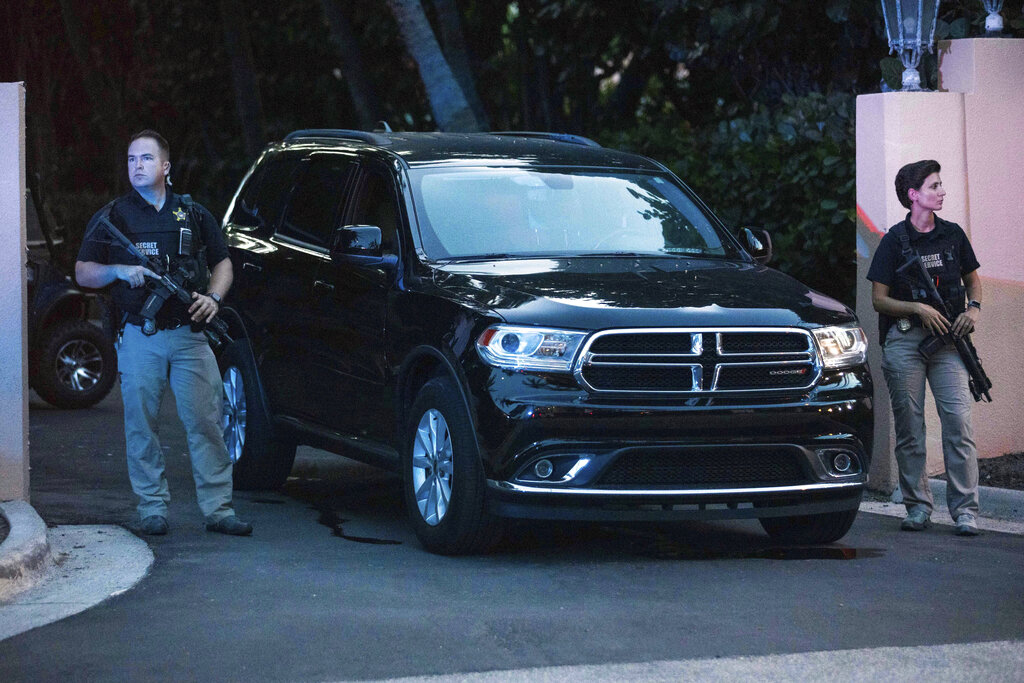FBI agents found 11 sets of classified documents during their search at former President Donald Trump‘s Florida estate Monday, some of which contained Top Secret Sensitive Compartmented Information, or TS/SCI.
So what is Top Secret/Sensitive Compartmented Information clearance?
Three tiers exist for national security clearance that range from the lowest level to the highest, including confidential, secret, and top secret, according to the Technology Transformation Services Handbook, which breaks down the key security clearance levels of government agencies.
The top secret category warrants the second highest degree of protection, requiring officials who decide the designation to consider whether the information could cause grave damage to national security if it became public knowledge. SCI stands for sensitive compartmented information, a classification for documents considered to be above top secret.
READ IN FULL: FBI’S UNSEALED SEARCH WARRANT FOR TRUMP MAR-A-LAGO RAID

“Special Sensitive work requires access to Sensitive Compartmented Information and therefore a Top Secret / Sensitive Compartmented Information (TS/SCI) clearance. When TTS employees need a clearance, it is typically a TS/SCI,” according to the TTS Handbook, which specifies at the top secret level, some information is “compartmented.”
What was the Justice Department looking for?
The search warrant unsealed Friday afternoon identifies three federal crimes the Justice Department is looking for as part of the investigation: It cited 18 U.S. Code 793 (part of the Espionage Act) related to “gathering, transmitting, or losing defense information.” The warrant also pointed to 18 U.S. Code 2071 on “concealment, removal, or mutilation generally” and 18 U.S. Code 1519 on “destruction, alteration, or falsification of records in Federal investigations and bankruptcy.” The latter relates to potential obstruction of justice.
Notably, the FBI confiscated “various classified/TS/SCI documents” from Trump’s estate, which are labeled under the designation reserved for highly sensitive materials that are vital to U.S. national security.
Among several other items labeled “Miscellaneous” were confidential documents, secret documents, and top secret documents.
But Trump says he “declassified” everything?
Earlier Friday, Trump pushed back on reports indicating that the FBI obtained multiple sets of classified information from the Florida resort, saying that before he left his position, he had “declassified” everything.
Needless to say, procedures for declassification of materials are a complex matter. A sitting president does have authority and may declassify anything at any time, though it is subject to certain provisions under the Atomic Energy Act.
It is common among different agencies to have questions and disagreements on whether material should be classified, according to Jeffrey Fields, a professor at the University of Southern California’s Dornsife College of Letters, Arts, and Sciences and a former analyst for the State Department and the Department of Defense.
“Other issues are not so obvious,” he wrote for the Conversation, asking, “Should the mere fact that the secretary of state had a conversation with a counterpart be classified?”
Any potential punishment for mishandling classified information is subject to contextual analysis.
Federal law (18 U.S. Code § 1924) states that anyone who “knowingly removes such documents or materials without authority and with the intent to retain such documents or materials at an unauthorized location shall be fined under this title or imprisoned for not more than five years, or both.”
Will the public ever know what these materials specifically contained?
Due to the highly sensitive nature of TS/SCI, it is not immediately clear at this time whether investigators will publicly acknowledge what they are referring to or whether they will be released to the public.
CLICK HERE TO READ MORE FROM THE WASHINGTON EXAMINER
The Washington Post reported Thursday evening that “classified documents relating to nuclear weapons were among the items FBI agents sought” in the Mar-a-Lago raid, according to “people familiar with the investigation.”
Trump denied that, saying that the “nuclear weapons issue is a hoax, just like Russia, Russia, Russia was a hoax … the Mueller investigation was a hoax, and much more.”
